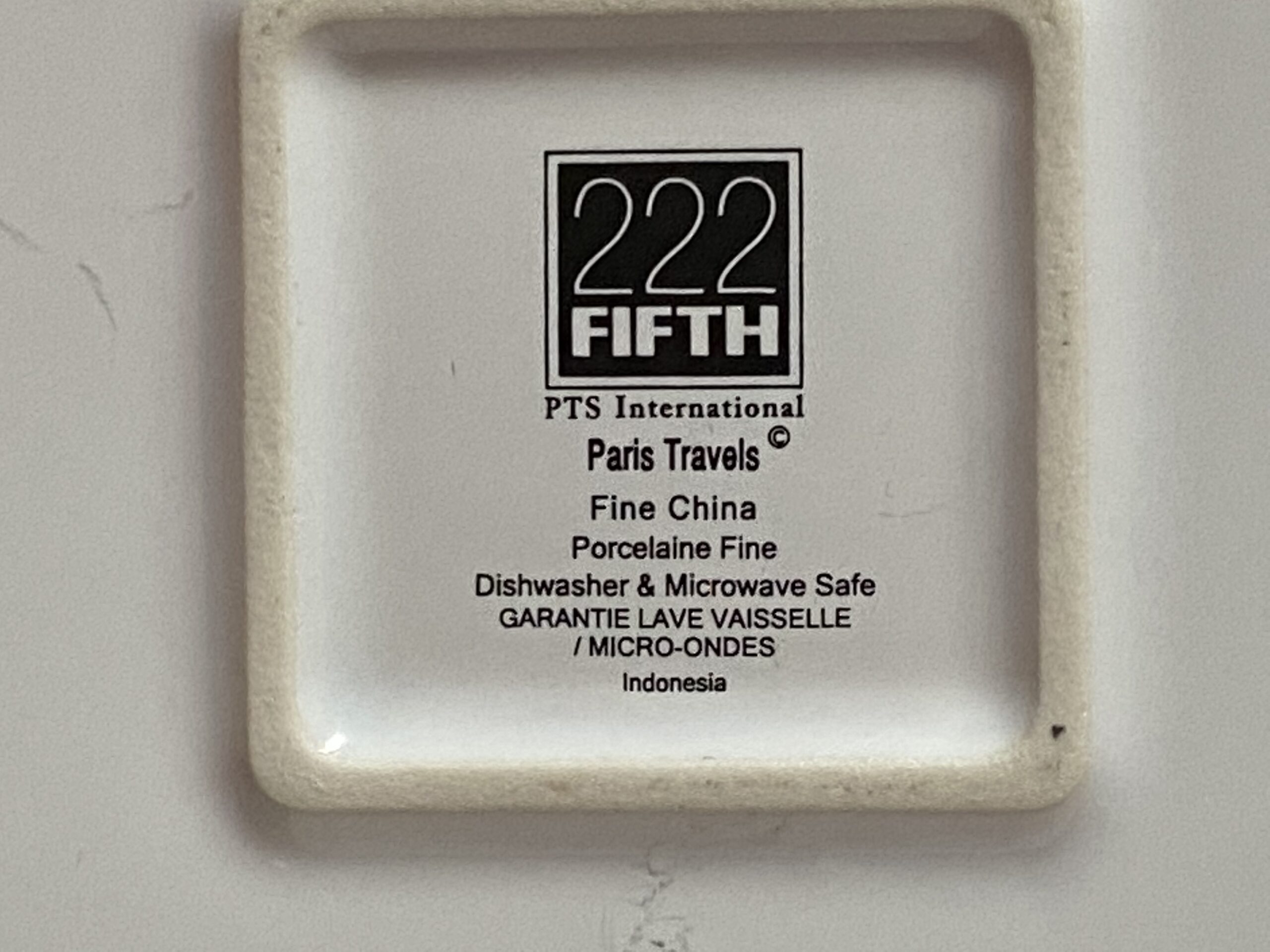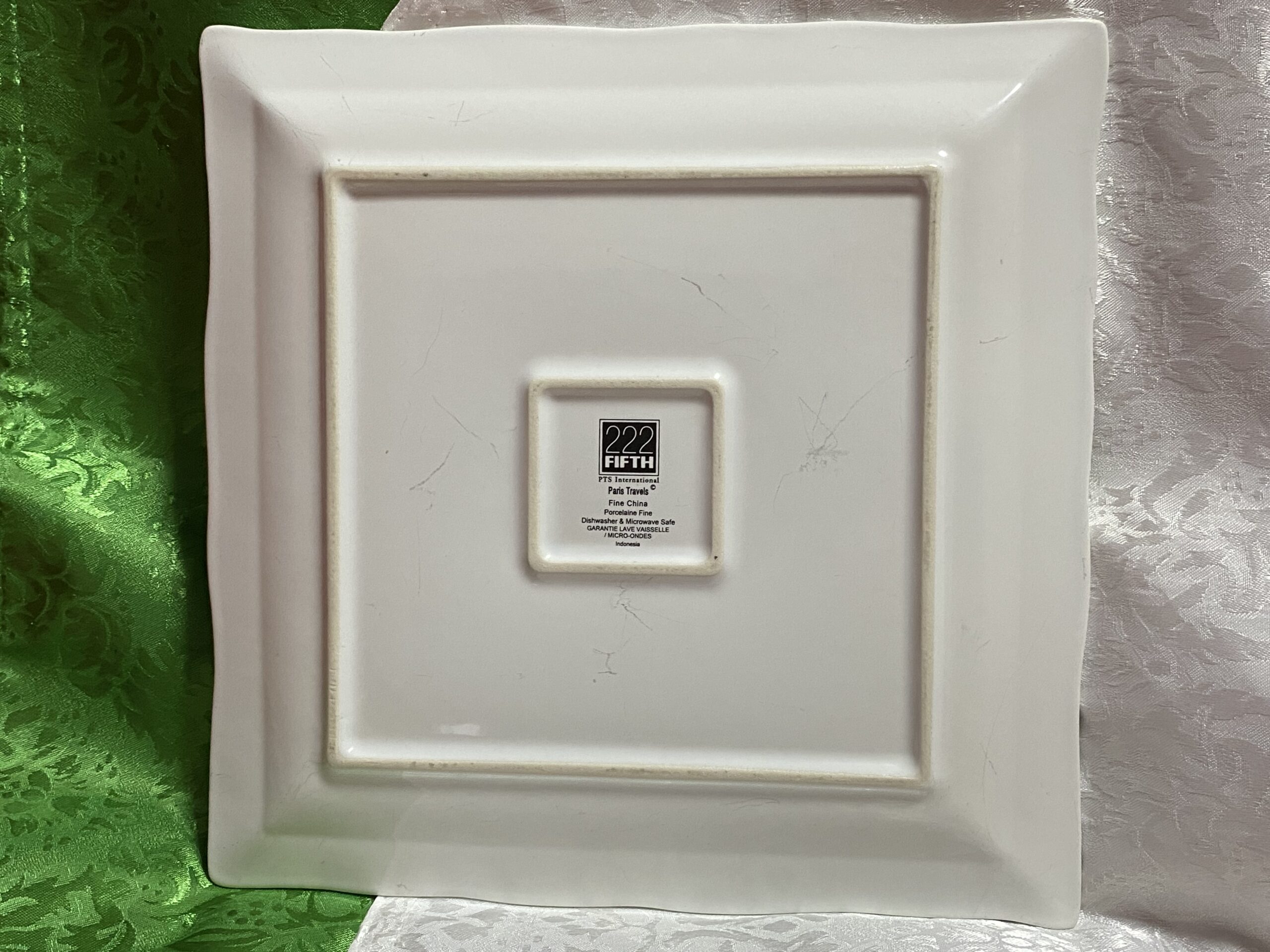222 Fifth “Paris Travels” Square Dish – Made in Indonesia: 62 ppm Lead on the food surface (safe by all standards) & 6,516 ppm Lead on the back mark.
Published: Tuesday – December 14, 2021
How much Lead is “too much” Lead?
In any item intended for use by children, Lead content must be below 90 ppm in the paint, glaze, or coating for the item to be legal (and any Lead present in the substrate of an item needs to be below 100 ppm), as regulated by the Consumer Product Safety Commission.
[Crazy-but-true fact: dishes and cookware are not covered by this regulatory standard, because [except in the State of Washington] dishes and cookware are not considered to be “items intended for use by children” — despite the obvious fact that CHILDREN CONSUME FOOD THAT IS PREPARED in the COOKWARE and SERVED on the DISHES.]
XRF Readings for colorful 222 Fifth “Paris Travels” Plate
Reading #1) Blue black glazed area on the food surface (bike)
30-second test
- Lead (Pb): 57 +/- 9 ppm
- Cadmium (Cd): non-detect
- Mercury (Hg): non-detect
- Bromine (Br): non-detect
- Chromium (Cr): 1,144 +/- 186 ppm
- Vanadium (V): 657 +/- 371 ppm
- Mn (Manganese): 825 +/- 119 ppm
- Iron (Fe): 1,364 +/- 92 ppm
- Cobalt (Co): 9,140 +/- 191 ppm
- Copper (Cu): 459 +/- 30 ppm
- Zinc (Zn): 7,342 +/- 129 ppm
- Zirconium (Zr): 25,300 +/- 400 ppm
- Tin (Sn): 45 +/- 7 ppm
- Barium (Ba): 330 +/- 30 ppm
- Platinum (Pt): 260 +/- 36 ppm
- Bismuth (Bi): 146 +/- 12 ppm
- No other metals detected in consumer goods mode.
Reading #2) Gray glazed area on the food surface (map)
30-second test
- Lead (Pb): 27 +/- 8 ppm
- Cadmium (Cd): non-detect
- Mercury (Hg): non-detect
- Bromine (Br): non-detect
- Chromium (Cr): non-detect
- Iron (Fe): 1,163 +/- 90 ppm
- Copper (Cu): 533 +/- 33 ppm
- Zinc (Zn): 5,756 +/- 108 ppm
- Zirconium (Zr): 25,400 +/- 400 ppm
- Tin (Sn): 19 +/- 7 ppm
- Barium (Ba): 279 +/- 30 ppm
- Platinum (Pt): 278 +/- 34 ppm
- Bismuth (Bi): 17 +/- 9 ppm
- No other metals detected in consumer goods mode.
Reading #3) Brown glazed area on the food surface (building)
30-second test
- Lead (Pb): 62 +/- 9 ppm
- Cadmium (Cd): non-detect
- Mercury (Hg): non-detect
- Bromine (Br): non-detect
- Chromium (Cr): 1,478 +/- 205 ppm
- Manganese (Mn): 1,353 +/- 139 ppm
- Iron (Fe): 2,355 +/- 115 ppm
- Cobalt (Co): 1,505 +/- 74 ppm
- Nickel (Ni): 89 +/- 47 ppm
- Copper (Cu): 521 +/- 32 ppm
- Zinc (Zn): 5,551 +/- 106 ppm
- Titanium (Ti): 3,189 +/- 757 ppm
- Zirconium (Zr): 22,600 +/- 400 ppm
- Tin (Sn): 23 +/- 7 ppm
- Barium (Ba): 261 +/- 29 ppm
- Platinum (Pt): 274 +/- 34 ppm
- Bismuth (Bi): 71 +/- 10 ppm
- No other metals detected in consumer goods mode.
Reading #4) Green glazed area on the food surface
30-second test
- Lead (Pb): 61 +/- 9 ppm
- Cadmium (Cd): non-detect
- Mercury (Hg): non-detect
- Bromine (Br): non-detect
- Chromium (Cr): 4,398 +/- 277 ppm
- Iron (Fe): 765 +/- 82 ppm
- Cobalt (Co): 419 +/- 46 ppm
- Nickel (Ni): 448 +/- 52 ppm
- Copper (Cu): 493 +/- 32 ppm
- Zinc (Zn): 5,806 +/- 110 ppm
- Titanium (Ti): 11,500 +/- 900 ppm
- Zirconium (Zr): 24,500 +/- 400 ppm
- Tin (Sn): 112 +/- 8 ppm
- Antimony (Sb) 67 +/- 12 ppm
- Barium (Ba): 280 +/- 30 ppm
- Platinum (Pt): 266 +/- 35 ppm
- Bismuth (Bi): 73 +/- 10 ppm
- No other metals detected in consumer goods mode.
Reading #5) Orange glazed area on the food surface
30-second test
- Lead (Pb): 50 +/- 11 ppm
- Cadmium (Cd): 305 +/- 10 ppm
- Mercury (Hg): non-detect
- Bromine (Br): non-detect
- Chromium (Cr): 2,115 +/- 220 ppm
- Vanadium (V): 2,677 +/- 418 ppm
- Iron (Fe): 1,729 +/- 98 ppm
- Cobalt (Co): 276 +/- 43 ppm
- Nickel (Ni): 79 +/- 43 ppm
- Copper (Cu): 470 +/- 30 ppm
- Zinc (Zn): 6,177 +/- 111 ppm
- Titanium (Ti): 4,057 +/- 746 ppm
- Zirconium (Zr): 22,000 +/- 400 ppm
- Tin (Sn): 40 +/- 7 ppm
- Barium (Ba): 265 +/- 28 ppm
- Platinum (Pt): 238 +/- 33 ppm
- Bismuth (Bi): 213 +/- 12 ppm
- No other metals detected in consumer goods mode.
Other colors tested similarly
Reading #6) Back-mark on dish
30-second test
- Lead (Pb): 6,156 +/- 100 ppm
- Cadmium (Cd): 115 +/- 7 ppm
- Mercury (Hg): non-detect
- Bromine (Br): non-detect
- Chromium (Cr): 4,057 +/- 261 ppm
- Manganese (Mn): 624 +/- 130 ppm
- Iron (Fe): 5,911 +/- 175 ppm
- Cobalt (Co): 2,520 +/- 99 ppm
- Nickel (Ni): 677 +/- 60 ppm
- Copper (Cu): 521 +/- 34 ppm
- Zinc (Zn): 5,365 +/- 105 ppm
- Zirconium (Zr): 29,000 +/- 500 ppm
- Tin (Sn): 30 +/- 8 ppm
- Barium (Ba): 339 +/- 34 ppm
- Platinum (Pt): 383 +/- 44 ppm
- No other metals detected in consumer goods mode.
As always, please let me know if you have any questions. I will do my best to answer them personally as soon as I have a moment – but it may be a while (kids underfoot nearly 24/7 since the start of the pandemic, y’know!)
Tamara Rubin
#LeadSafeMama
Owner, Lead Safe Mama, LLC
Amazon links are affiliate links. If you purchase something after clicking on one of these links, Lead Safe Mama, LLC may receive a small percentage of what you spend – at no extra cost to you.
For those new to this website:
Tamara Rubin is a Federal-award-winning independent advocate for consumer goods safety. She is also a mother of Lead-poisoned children. She began testing consumer goods for toxicants in 2009 and was the parent-advocate responsible for finding Lead in the popular fidget spinner toys in 2017. Tamara uses XRF testing (a scientific method used by the U.S. Consumer Product Safety Commission) to test consumer goods for toxicants, including Lead, Cadmium, Mercury, Antimony and Arsenic. All test results reported on this website are science-based, accurate and replicable. Items are tested multiple times to confirm the test results for each component tested. Here is a link to a post that discusses the testing methodologies used for the test results reported and discussed on this site.

Never Miss an Important Article Again!
Join our Email List




